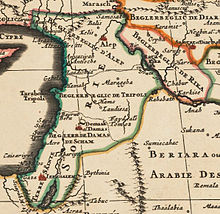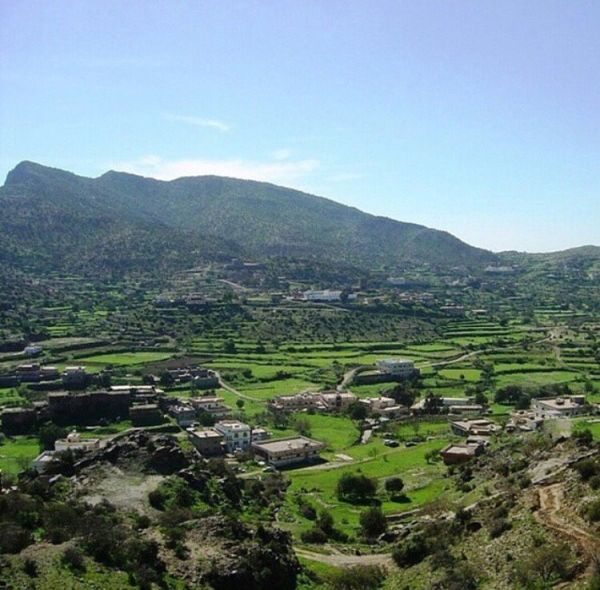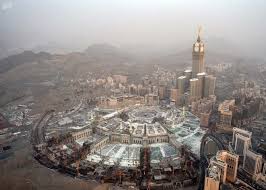JazakAllahu khayr for writing about this! If you would, please help us readers better understand why at times the region is referred to as "Palestine" and at others as "Jordan" and "Syria."
Also, do you know if people warn each other and take extra care to avoid defiling the house by using the "toilet?" Inshaallah people are aware and inshaallah they avoid it.
The second question refers to the Saʿūdī regime turning the home of our Mother, Khadījah (رضي الله عنها) into a toilet.
Reply
1. Syria in Islām
It should first be noted that the modern Syrian republic is a relatively recent construct of French colonialism. Historically Syria or ʾash-Shām includes a much vaster area. The historical and Islāmic Syria includes the lands of Palestine, Jordan, Lebanon and border areas of Turkey (Antioch) and Arabia (Tabūk). The below map indicates the true area of historical Syria. This is what Islāmic texts have referred to as Syria for centuries, going back to Roman times. Bear in mind however, that exact borders covering every inch of the map is also a relatively new concept of the past two centuries of human history. Historically borders were grey, undefined regions, not exact lines.

Thus Palestine and Jordan are regions within Syria. In regards the commentary on the origin of ʾāṭ-Ṭāʾif, it is agreed that it originated from historical Syria. Specifically which area of Syria though? There are differing opinions on that. Some support the view of the Palestine region within Syria, others advocate the Jordan region, east of Palestine, which is also part of Syria.
It may also be noted that Muslims have also used the term Palestine throughout our history, despite it being a region within Syria. This can be seen for example in the Qurʾān commentary cited in the āṭ-Ṭāʾif article. Zionists lie and claim that as we used the term Syria to include Palestine, we never had a concept of Palestine before. This lie is the same as claiming that as Americans use the term USA, they have no concept of Virginia.
It is important for a Muslim to understand the correct definition of Syria on at least four different levels:
- When the Qurʾān speaks of the land blessed around ʾal-ʾAqṣā, it covers all of Syria, e.g. ʾal-ʾIsrā: 1.
- Ḥadīth which refer to the virtues or past events of Syria are not specific to the modern republic, e.g.
Zayd bin Ṭhābit (رضي الله عنه) narrates that Allāh’s Messenger (صلى الله عليه و سلم) exclaimed, “Congratulations to Syria!” “Why is that, O Messenger of Allāh?” we asked. He replied, “The angels of the Most Merciful spread their wings over her.” [ʾat-Tirmiẓī]
- Islāmic history refers to the Syria of Allāh’s Messenger (صلى الله عليه و سلم), not the Damascus region only, e.g. ʿUmar (رضي الله عنه) appointing Muʿāwiyāh (رضي الله عنه) governor over Syria.
- Perhaps most importantly, in that there may be practical manifestation during our lifetime, is that the Ḥadīth refers to future events of the utmost significance which will transpire in Syria, e.g. the coming of Dajjāl and the armies of ʿĪsā (عليه السلام). Thus knowing the true definition of Syria as opposed to the colonial construct is vital.
2. Using the House of our Mother, Khadījah (رضي الله عنها) as a toilet
I am not aware of anyone ruling that this is prohibited. After all, the original noble inhabitants of the house must have engaged in mundane human activities themselves. We cannot prohibit people from something when there is no clear ruling on the matter. Prohibition is the sole right of Allāh. Especially in this age of ignorance, some may react inappropriately should we seek to warn them. They may even utter words of disrespect which may harm their faith. This is in terms of the letter of the law.
I raised the incident of the "toilet" as an example of the Satanic Saʿūd regime destroying the spirit of Islām. I cannot imagine that any Muslim who has love and respect for Allāh’s Messenger (صلى الله عليه و سلم) and his beloved wife, would feel at ease defiling a place so associated with such lofty personalities, who should be more beloved to us than our own parents. Such feeling is based on love, irrespective what the law permits or prohibits.
ذَٰلِكَ وَمَن يُعَظِّمْ شَعَائِرَ اللَّهِ فَإِنَّهَا مِن تَقْوَى الْقُلُوبِ
That [is so]. And whoever honours the symbols of Allah - indeed, it is from the piety of hearts. [ʾal-Ḥajj :32]
I would certainly inform people of the truth, especially those who might appreciate such knowledge. What they choose to do with that knowledge is up to them.
That being said, there is no doubt that intentional disrespect to Allāh’s Messenger (صلى الله عليه و سلم), whether in word or deed, is not a mere prohibition, but a cause for expulsion from Islām. Allāh knows best what lurks in the heart, but the most charitable statement that can be said of the Satanic House of Saʿūd is that history testifies to their continuous and vile assaults upon the memory of Allāh’s Messenger (صلى الله عليه و سلم). Are they intentionally disrespectful hypocrites and apostates? Allāh knows best. Should their filthy presence be removed from the sacred cities? I pray from the bottom of my heart for that blessed day.
سليمان الكندي
@sulayman_kindi

 Region around ʾaṭ-Ṭāʾif[/caption]
Region around ʾaṭ-Ṭāʾif[/caption] Makkah[/caption]
Makkah[/caption]